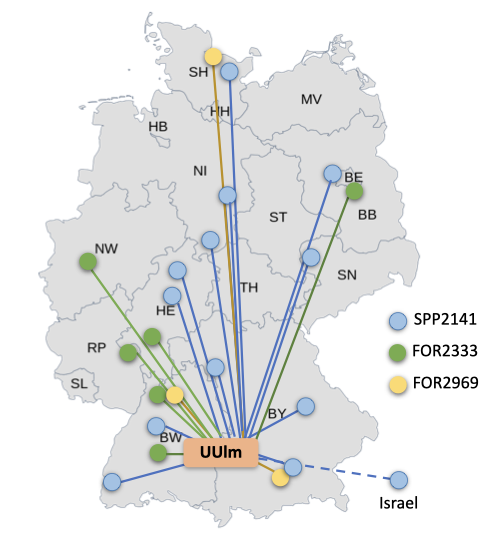Stress response & resilience of biological systems
The research focus of the life sciences shapes both research and teaching at the university, as well as local and national scientific projects and collaborations.
The research focus of the life sciences shapes both research and teaching at the university, as well as local and national scientific projects and collaborations.
We are talking about climate change and an aging society - both problems whose effects are occupying researchers worldwide more than ever.
Biological systems in particular are exposed to constant challenges, for which they have been able to develop resilience strategies over millions of years in order to be able to respond to harmful processes resulting from stress.
However, the currently too sudden changes due to climate change, environmental toxins, changes in food resources, aging of society do not allow evolutionary adaptations.
The Department of Biology at the University of Ulm focuses its research on stress response and resilience of biological systems.
This research focus is supported by two solid pillars that cover the entire scale from ecosystems to molecular processes at the atomic level.
The various research topics are therefore closely interlinked in terms of content and also often in practice.
The two pillars are not rigidly separated, but rather should be seen as a scaled continuum of the same question.
An overview, which should schematically give an idea of the spectrum of research, can be seen in the figure on the left.
On the one hand, the aim is to understand how cells, organisms and their molecular interactors respond to environmental influences and genetic defects. This approach will be used to understand misdirected responses and resulting pathological processes as well as to discover new cellular defense strategies. Second, previously identified defense strategies, including symbiotic microbiomes and previously unexplored CRISPR systems from archaea, will be investigated.
Given an aging society, major diagnostic advances in identifying novel genetic defects, and novel genome editing (CRISPR) capabilities, this range of topics is highly relevant to society and exceptionally well suited for inter- and transdisciplinary research approaches.
The consequences of climate-associated and anthropogenic activity-induced stressors (e.g., severe weather, droughts, emergence of new diseases, land-use intensification, fragmentation, increased pesticide inputs, and other stressors) have immense impacts not only on natural ecosystem function, but also on our society.
Therefore, our goal is to uncover resilience mechanisms to abiotic and biotic environmental stressors and use them to promote sustainable resilience in complex ecosystems. The methodology of functional and synthetic microbiomics used for this purpose, among others, is crucial in the interpretation of multitrophic interactions and the development of tailor-made applications. Furthermore, this know-how is an integral part of an innovative further development of the education and research location Ulm.

The life sciences hold great potential in diverse fields of work and application; interdisciplinary work and research, as well as the transfer of knowledge, teaching and learning to society and industry characterize the department.
The courses of study in biology, biochemistry, industrial and pharmaceutical biotechnology impart appropriate methods and skills and are closely linked to research operations.